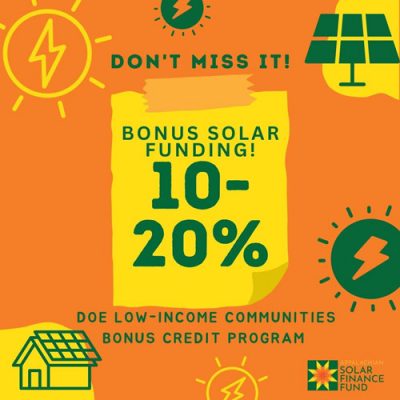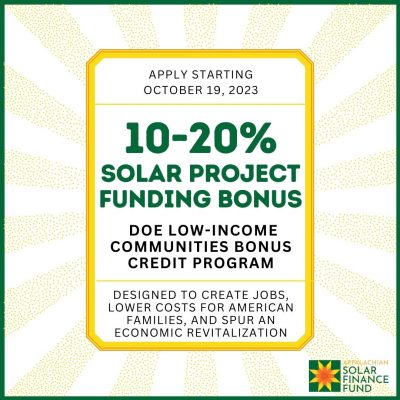Special to the Front Porch: This blog was initially posted on the the Appalachian Solar Finance Fund website.)
Low-income communities across Appalachia can apply for a BONUS 10 to 20% tax credit available to eligible solar projects. There’s a limited priority application window for this tax credit, which can be stacked on top of other solar incentives!
 The Department of Energy’s Low-Income Communities Bonus Credit Program provides a 10 or 20 percentage point increase to the investment tax credit for qualified solar and wind energy facilities with a maximum net output of less than five megawatts (AC). A 10% bonus is available to eligible projects installed in low-income communities or on Tribal land, and a 20% bonus is available to eligible projects that are part of a qualified low-income residential building or provide qualified low-income economic benefits. This is in addition to the baseline federal solar Investment Tax Credit, or ITC, which covers 30% of the total solar project cost.
The Department of Energy’s Low-Income Communities Bonus Credit Program provides a 10 or 20 percentage point increase to the investment tax credit for qualified solar and wind energy facilities with a maximum net output of less than five megawatts (AC). A 10% bonus is available to eligible projects installed in low-income communities or on Tribal land, and a 20% bonus is available to eligible projects that are part of a qualified low-income residential building or provide qualified low-income economic benefits. This is in addition to the baseline federal solar Investment Tax Credit, or ITC, which covers 30% of the total solar project cost.
Much of Appalachia is qualified for a 10% tax credit for eligible projects located in a qualified low-income community. See if your project is in the geographic zone here:
HOW TO APPLY: Applications submitted between Oct. 19 and Nov. 18, 2023, will be treated as submitted on the same date and at the same time. Applications submitted after the first 30 days will be considered on a rolling basis. The U.S. Department of Energy plans to accept applications for the 2023 program year through early 2024, depending on the volume of applications.
The Department of Energy will review applications and make recommendations to the Internal Revenue Service, which will allocate bonus credits for up to 1.8 gigawatts of eligible solar and wind facilities per year. Final regulations on the Low-Income Communities Bonus Credit are available for review, and an application checklist is also available.
Under a new federal law, tax-exempt entities, such as local governments and nonprofit organizations, can now access the value of the solar Investment Tax Credit and related tax credit bonus programs (including the Low-Income Communities Bonus Credit and the Energy Community Tax Credit Bonus) through a newly established “elective payment” mechanism. This option effectively turns the income tax-based ITC and related bonuses into a grant from the federal government. Tax-exempt entities, including 501c nonprofit organizations, state/local/Tribal governments, publicly owned utilities, and rural electric cooperatives, will receive the ITC’s equivalent value as a direct payment from the U.S. Treasury.
The potential is enormous. By combining the solar ITC and the Low-Income Communities Bonus Credit, a qualified low-income housing project could receive direct payment from the federal government for 50% of a solar project’s cost! That percentage could be higher if the project is located in a community that qualifies for the Energy Community Tax Credit Bonus. Imagine how this could impact residents’ power bills!
Learn more about the Low-Income Communities Bonus Credit Program
Build the Solar Project of Your Dreams
Build a brighter future for your community by powering your organization with solar energy! Public institutions and nonprofit organizations can apply for a direct grant sub-award to offset up to 20% of the total project cost from the Appalachian Solar Finance Fund to build your next solar project. The SFF also supports roof repair funding for buildings needing cost assistance for pre-solar roof maintenance or replacement — up to 20% of the total cost of roof repair, up to $20,000 per project.
Commercial businesses acting as anchor institutions to address social needs and generate community-based benefits can also qualify for solar project assistance. Apply to the Appalachian Solar Finance Fund for predevelopment technical assistance, cost support, and credit enhancements to get a project off the ground. This can help your business access larger federal grants, and the SFF can serve as a guiding partner to get the job done!
Read this blog post to learn how to stack your credits to fund your solar project.
The Appalachian Solar Finance Fund can help make your solar power dream a reality!
 If you have a BIG dream, let us know! The Appalachian Solar Finance Fund can help unlock funding and financing opportunities for high-need, high-impact solar projects in coal-impacted communities throughout Central Appalachia.
If you have a BIG dream, let us know! The Appalachian Solar Finance Fund can help unlock funding and financing opportunities for high-need, high-impact solar projects in coal-impacted communities throughout Central Appalachia.
In addition to direct project funding, the Solar Finance Fund has built a solution to cover a short-term solar financing need created by the 2022 federal Inflation Reduction Act. This law has established a direct payment option to allow tax-exempt entities to access the value of the federal energy Investment Tax Credit. This tax credit offsets a total cost of 30% or more of a solar project! It’s great news for public institutions and nonprofits seeking to go solar. But it also means that many public institutions and nonprofits may need short-term bridge financing to cover the time gap between a solar project’s construction and the federal government’s eventual remittance of the ITC.
The Solar Finance Fund can help support these emerging solar financing needs by providing short-term low- to zero-interest bridge loans for impactful solar projects via our partner organization, Invest Appalachia. The SFF can also award sub-grants to offset interest and fees accrued on ITC bridge loans issued by traditional lenders for public and nonprofit solar projects.
Moreover, the Solar Finance Fund and Invest Appalachia have developed a flexible suite of solar credit enhancements, including interest-rate buydowns and loan guarantees, to help leverage large-scale repayable investment into promising solar projects that face financing obstacles related to risk migration, cost of capital or timing of investment. These innovative financial tools are designed to absorb risk and/or cost to help secure the overall capital stack for an impactful project.
Apply for funding support for your solar project
With so many funding and financing solutions, why not dream up a solar project for your community today? The Solar Finance Fund accepts applications on a rolling basis. Get all the details here.



Leave a Reply